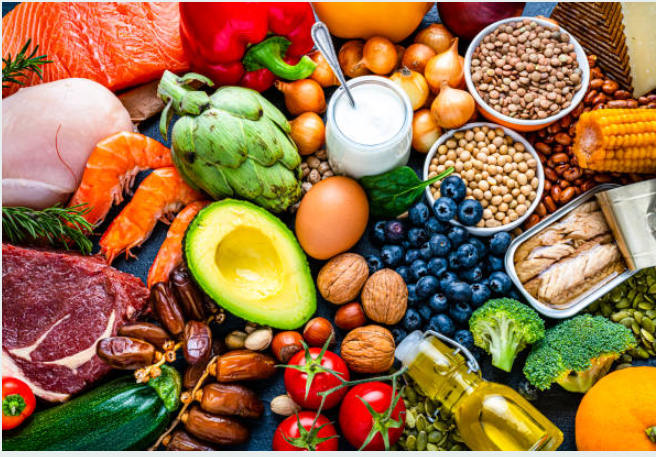Effective Strategies for Sustainable Weight Loss: A Comprehensive Guide
Good day greet hivers, hope your day is moving well. Am back this afternoon to share my knowledge on WEIGHT LOSS, keep reading, I believe you will find it interesting.
Weight loss refers to the process of reducing body weight, usually with the intention of improving overall health, achieving a specific body shape, or managing medical conditions related to excessive body weight. It commonly involves a combination of dietary adjustments, increased physical activity, and lifestyle modifications aimed at creating a calorie deficit, which prompts the body to use stored energy (fat) for fuel. Successful weight loss is often associated with improved cardiovascular health, reduced risk of certain diseases, enhanced mobility, and increased overall well-being.
Effective Strategies for Weight Loss:
Caloric Deficit:
Creating a caloric deficit is the fundamental principle of weight loss. Consuming fewer calories than your body needs forces it to utilize stored energy, resulting in weight loss over time. However, it's crucial to achieve this deficit through a combination of diet and exercise rather than extreme calorie restriction, which can have adverse effects on metabolism and overall health.Hydration:
Adequate hydration is often overlooked in weight loss discussions, yet it plays a crucial role. Drinking water before meals can help reduce calorie intake, and staying hydrated can prevent confusion between hunger and thirst, ultimately supporting weight loss efforts.Mindful Eating:
Practicing mindful eating involves paying attention to hunger cues, eating slowly, and savoring each bite. It helps prevent overeating and allows for a better connection between the body and the food being consumed. By focusing on the eating experience, one can develop a healthier relationship with food, leading to more sustainable weight loss.Meal Planning and Portion Control:
Planning meals in advance and controlling portion sizes can contribute significantly to weight loss. Using smaller plates, measuring food quantities, and being mindful of serving sizes can prevent overconsumption and promote healthier eating habits.Regular Physical Activity:
Combining a healthy diet with regular physical activity is crucial for sustainable weight loss. Engaging in a combination of cardiovascular exercises, strength training, and flexibility exercises not only aids in burning calories but also helps build lean muscle mass, which can increase the overall metabolic rate.Quality Sleep:
Sleep plays a vital role in weight management. Inadequate sleep can disrupt hormonal balance, leading to increased hunger, cravings for high-calorie foods, and a slowed metabolism. Prioritizing quality sleep by maintaining a consistent sleep schedule and creating a conducive sleep environment can positively impact weight loss efforts.Stress Management:
Chronic stress can lead to emotional eating and the consumption of calorie-dense comfort foods, which can hinder weight loss efforts. Implementing stress management techniques such as mindfulness, meditation, yoga, and regular relaxation practices can help in maintaining a healthy mindset and promoting weight loss.
It's essential to approach weight loss as a gradual and sustainable process rather than seeking rapid, short-term solutions. Consulting a healthcare professional or a registered dietitian can provide personalized guidance and support tailored to your specific needs and health goals. Remember, sustainable weight loss is about making long-term lifestyle changes that promote overall well-being and health.
Weight loss is a common health goal for many people, and understanding the role of food in this process is crucial. While there is no magic food that can guarantee instant weight loss, incorporating certain types of foods into your diet can certainly support your weight loss journey. Here's a look at some of the food groups that can help you achieve your weight loss goals effectively:
Protein-Rich Foods:
Including protein-rich foods such as lean meat, poultry, fish, eggs, legumes, and dairy products in your diet can aid weight loss. Protein helps in boosting metabolism, reducing appetite, and promoting feelings of fullness, leading to reduced calorie intake.Fiber-Rich Foods:
Fiber-rich foods like whole grains, fruits, vegetables, and legumes can be highly beneficial for weight loss. High-fiber foods contribute to satiety, slow digestion, and help regulate blood sugar levels, thereby preventing unhealthy snacking and overeating.Healthy Fats:
Contrary to popular belief, incorporating healthy fats like avocados, nuts, seeds, and olive oil into your diet can support weight loss. These fats help in promoting satiety, enhancing nutrient absorption, and providing a feeling of satisfaction, preventing excessive calorie consumption.Low-Calorie Vegetables:
Vegetables such as leafy greens, cucumbers, tomatoes, and bell peppers are low in calories and high in essential nutrients. Including these in your meals can increase the volume of food you consume without significantly increasing the calorie intake, thus promoting weight loss.Fruits:
While fruits contain natural sugars, they also provide essential vitamins, minerals, and dietary fiber. Opt for fruits such as berries, apples, and citrus fruits, which are relatively lower in calories and high in nutritional value.Whole Grains:
Whole grains like brown rice, quinoa, and oats are rich in fiber and nutrients, making them a healthier option than refined grains. They help in maintaining stable blood sugar levels and keeping you full for longer, thus aiding in weight management.Herbs and Spices:
Some herbs and spices like cayenne pepper, ginger, turmeric, and cinnamon have been found to have metabolism-boosting properties. Incorporating these into your diet not only adds flavor but can also potentially support your weight loss efforts.
While these food groups can aid in weight loss, it's essential to remember that maintaining a healthy weight is not just about what you eat, but also about how much you eat and other lifestyle factors such as physical activity, stress management, and adequate sleep. Creating a balanced and sustainable diet plan that suits your individual needs and preferences, along with regular exercise, is key to achieving and maintaining a healthy weight in the long run. Always consult a healthcare professional or a registered dietitian before making significant changes to your diet or exercise routine.
Thank you for making out time to read my article, I strongly believe you find it so interesting. Please don't forget to upvotes and comment as it encourages me the more........I love you all.



There is reasonable evidence that this article is machine-generated. Posting such content is considered fraud. Fraud is discouraged by the community and may result in the account being Blacklisted.
Guide: AI-Generated Content = Not Original Content
If you believe this comment is in error, please contact us in #appeals in Discord.